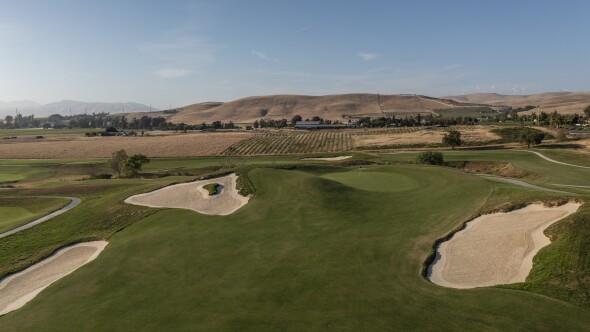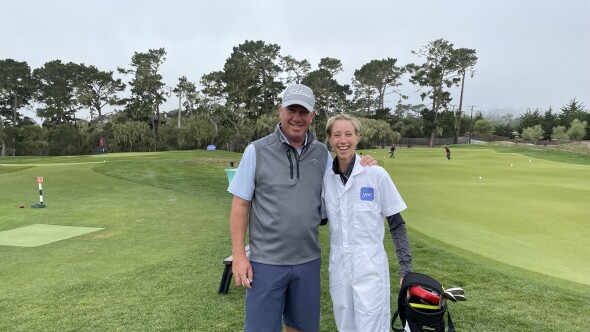Not even the best golf course architects in the world are immune from golf course closures.
Having covered golf course closures for more than a decade, I've learned a few things along the way. It doesn't matter how good the course is. It doesn't matter how famous the designer is.
A course will close if a) Ownership doesn't properly manage its asset, and/or b) it doesn't have a solid business plan. That business model might be requiring local support or that golfers travel a great distance to experience it. Whatever the case might be, the numbers - money brought in versus expenses going out - have to add up to keep the grass cut. It's Economics 101.
Architects don't have anything to do with this numbers game. They're artists and contractors. They do the painting, the sculpting, and then turn over their masterpiece to the bean counters. Sometimes things go wrong from there.
It can't be easy watching a project you spent years of your life building just disappear. Two of golf's most prominent architects of all time - Tom Fazio and Robert Trent Jones Jr. - have seen two different facilities tied to them shuttered in the last six months. These closures got me wondering what other prominent modern architects have suffered the same event. Turns out it's more prevalent than you probably think. Here's a look at the course closures of golf's 10 most successful modern architects:
Bill Coore & Ben Crenshaw

Golf's most successful duo of all-time has been working together for almost four decades, but the best might be yet to come as they have number high-profile jobs in the works. Prior to joining forces in 1986, Coore designed a handful of projects on his own, including King's Crossing (1986-2008) in Corpus Christi, Texas, which closed during the Great Recession. Sugarloaf Mountain (2008-2013), a central Florida real estate play that faltered, might end up being the only C&C project that ever goes belly-up. They're at the stage of their careers where they only pick the best, most stable opportunities.
Pete Dye

To be honest, I'm surprised more courses designed by Pete Dye haven't closed. His designs don't just prey on the weakness of golfers, their hazards and visual tricks bully players into submission. I've enjoyed a few Dye courses over the years - I thought Ocean Links was cool and the Ocean Course at Kiawah Island is epic - but there's a few I hope I never play again.
Jack Nicklaus
Having lived in California for a decade now, it's entirely understandable that the 36 holes at Diablo Grande have closed. Summers are too hot for sustainable golf at their inland location, and water is expensive and in short supply. The same goes for Dye's Simi Valley courses. They were just built in the wrong place at the wrong time by overambitious developers who thought population growth would send home owners and golfers their way. They bet wrong.
Tom Fazio

Are Tom Fazio designs too big to fail? It seems that way. Four prominent Fazio projects have closed during the Golf Advisor/GolfPass era, but three of them have made comebacks after closures: Wynn Golf Club in Las Vegas, Butterfield Trail in El Paso, Texas; and the Prince Course at Princeville (now called North Shore Preserve, an uber-exclusive Discovery Land property). There are rumors that Primm Valley's courses, which closed last year, could reopen if a buyer is found. Affordable California water, again, is a big issue. Paupack Hills was early Fazio collaboration with his uncle George.
Fazio has lost some of his designs to redesigns by competitors, including Pinehurst No. 4 to Gil Hanse and PGA National Resort's Champion Course to Nicklaus.
Gil Hanse

It's a bold step for a modern architect to have an "NLE" - no longer existing - section of courses listed on his website, but losing two courses to closure is hardly an indictment of Hanse's talent. He remains arguably the hottest architect on the planet, despite the closure of Tallgrass, which gave way to a solar panel development in 2015, and The Capstone Club, which closed in Alabama in 2014.
Tom Doak
Nobody's had more home runs in the modern era of design than Doak and his Renaissance Golf crew based in Traverse City, Mich. Doak leads all architects with the most Top 100 courses ever built. Like every great slugger, though, he's had more than his fair share of strikeouts, too. He got a second chance to save High Pointe, his first solo design in Williamsburg, which closed in 2008. A recent redesign has transformed sections of the original course into a new high-end private club. North Carolina's Charlotte Golf Links (1993-2014), Maryland's Beechtree Golf Club (1998-2008), California's Aetna Springs Golf Course (2008-2018) and Mexico's Bahia de los Suenos (2009-2013) weren't so lucky. They're likely gone for good.
Robert Trent Jones Jr.
I was on hand for one of the greatest comebacks in golf development history when RTJ II's Osprey Meadows in Idaho reopened last year at Tamarack Resort after a decade of lying fallow. It's rare for a course to be revived after being down for so long. Desert Dunes, which closed earlier this year in a crowded Palm Springs golf market, likely won't ever make it to the resuscitation table, however. RTJ II's Beach Course is still open on Hawaii Island, but the back nine was lost in 2023 to redevelopment, leaving a 27-hole combination for guests. Adobe Creek in Petaluma, Calif., north of the Golden Gate Bridge, closed in 2017.
Arnold Palmer

As popular as Palmer was as a player, he was just as polarizing as an architect. For how prolific his firm was, Palmer's design team never garnered much acclaim from critics. Only a handful of his best designs ever made it on "best of" state lists. That said, I enjoyed both La Cantera (2001-21) and Empire Lakes (1996-2016) when I played them years ago. I think both local communities still miss them.
Tom Weiskopf

I consider Weiskopf's one of the game's most underrated architects of all time. I haven't met a Weiskopf course I didn't like. That makes the 2009 closure of the Falls Course at Lake Las Vegas in Henderson, Nevada, such a shame. Its sister Nicklaus course was revived in 2014 after a five-year closure, while Weiskopf's work was chopped up for redevelopment with part of it transformed into a couple of practice holes and a teaching facility.
Greg Norman

Love him or hate him after the LIV Golf thing and his collapses in majors, The Great White Shark is still a prominent figure in the game. He's widely regarded as one of the best drivers of the golf ball of all time. He's a pretty darn good designer, too, overseeing creative courses from Mexico to Australia, America and beyond. His Great White Course was my second favorite course at Trump National Doral Miami, but it was sold off for redevelopment a decade ago.
Which closed golf courses from this list do you miss the most? Let us know in the comments below.
















































Jason, interesting article and I really do miss the Great White Course because it was unlike any other course in South Florida. But, make no mistake about it - Donald Trump never owned the course, as it was never part of the purchase. It was retained separately by the debt holder, leased by Trump for a few years and then redeveloped into homes. That was always the plan when the property went into receivership because it was always zoned eligible for housing...
Very sad to see the Desmond Muirhead designed Sea Ranch Links closed--pretty remote fabulous vacation spot. Wasn't the most fabulously challenging or immaculately groomed courses on the California coast, but LOCATION, LOCATION, LOCATION !
I will miss La Cantera, Beechtree, and Amelia Island Ocean the most!
Waterwood in Trinty Texas designed by Pete Dye was a great course that was too far in advance. About the time it opened the U.S. went in a gasoline shortage and recession. It only struggled to stay open about 10 years.
Although many course closures appear to be the result of practicalities (lack of water; financial issues), it’s also notable that greatness or fame as a course architect does not guarantee the immutability of one’s courses.
You’re right about Dye’s deliberate tendency for ornery designs or design features, at least when talking about most of his less-friendly layouts. I still like much of what I’ve played by the modern master. Possibly the meanest course I’ve ever played (the Club at P.B. Dye in Maryland) was indeed the work of P. B. Dye, one of his successors. Like father, like…
As an architect, I don’t think Palmer ever developed the kind of strong persona that distinguished him from his contemporaries, even though he was certainly capable. His “signature” courses, in my opinion, seemed to lack, ironically, a personal stamp. Having played some of them, I never experienced the sort of moment where one thinks, “This is a Palmer course.”
It’s puzzling to me–a bit, anyway–that, given his reputation, the number of Doak’s courses you’ve listed could have gone down the tubes. Does the general golfing public care all that much about reputation when they play “name-brand” golf courses?
Your analyses of Weiskopf, Norman, and Coore/Crenshaw are all incisive.
Nice to read an article that takes a solid critical stance, in contrast to the kind of major-golf publication writing in which criticism is falsely muted or becomes couched in dull pleasantries.